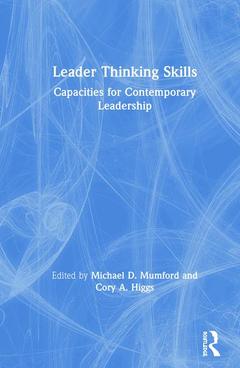Leader Thinking Skills Capacities for Contemporary Leadership
Coordonnateurs : Mumford Michael D., Higgs Cory A.

This book examines the various thinking skills that leaders may need to find success in contemporary organizations and institutions, covering a wide array of skills that are held to be important by key leadership scholars.
Bridging theory and practice, chapters summarize major findings with respect to a particular ability, knowledge, or skill, providing theoretical frameworks for understanding how these contribute to leader emergence and performance, and considering implications for leader selection, assessment, and development. The text appraises the existing research on the critical cognitive capabilities that underlie leader problem-solving and implications for the assessment and development of leadership potential in real-world settings. The role of creative thinking skills on leader performance is also addressed, bearing on the importance of processes such as problem definition and idea generation, but also using constraints to potentially stimulate creative thought.
With contributions from some of the most eminent scholars working in the field of leadership, this book will be in invaluable resource to academics, researchers, graduate students, and professionals interested in leadership and leader skills, I/O psychology, and business management.
Contents
List of Contributors
Introduction
Michael D. Mumford and Cory Higgs
Chapter 1: Intelligence and Leadership
John Antonakis, Dean Keith Simonton and Jonathan Wai
Chapter 2: Leadership and Information Processing: A Dynamic System, Dual-Processing Perspective
Robert G. Lord
Chapter 3: Uncertainty and Problem-Solving: The Role of Leader in Information Gathering Strategies
Jay J. Caughron, Teresa Ristow and Alison L. Antes
Chapter 4: Are Satisfied Employees Productive or Productive Employees Satisfied?: How Leaders Think About and Apply Causal Information
David R. Peterson
Chapter 5: Thinking About Causes: How Leaders Identify the Critical Variables to Act On
Michael D. Mumford, Cory A. Higgs, Erin Michelle Todd and Samantha Elliot
Chapter 6: Leaders’ Shifts in Attention During an Organizational Crisis: Longitudinal Evidence of Responses to a Crisis Within a Top Management Team
Ian A. Combe and David J. Carrington
Chapter 7: Creative Problem Solving: Processes, Strategies, and Considerations for Leaders
Kelsey E. Medeiros, Belinda C. Williams and Adam Damadzic
Chapter 8: Seeing the Future Through the Past: Forecasting Skill as a Basis for Leader Performance
Michael D. Mumford, Mark Fichtel, Tanner Newbold, Samantha England and Cory A. Higgs
Chapter 9: Leader Decision Making Capacity: An Information Processing Perspective
Shing Kwan Tam, Dawn L. Eubanks and Tamara L. Friedrich
Chapter 10: Making Sense of Leaders Making Sense
Peter Gronn
Chapter 11: Leaders, Teams, and their Mental Models
Jensine Paoletti, Denise L. Reyes and Eduardo Salas
Chapter 12: Leader Social Acuity
Stephen J. Zaccaro and Elisa M. Torres
Chapter 13: Leadership and Monitoring Skills
David V. Day, Ronald E. Riggio and Rowan Y. Mulligan
Chapter 14: Wisdom, Foolishness and Toxicity in Leadership: How Does One Know Which is Which?
Robert J. Sternberg
Index
Michael D. Mumford is the George Lynn Cross Distinguished Research Professor of Psychology at the University of Oklahoma and serves as the Director of the Center for Applied Social Research. His research focuses on leadership, creativity, ethics, and planning.
Cory A. Higgs is a graduate of the University of Oklahoma’s Industrial and Organizational Psychology program, and has completed work related to leadership, ethics, and creativity.
Date de parution : 08-2019
15.2x22.9 cm
Date de parution : 08-2019
15.2x22.9 cm
Thèmes de Leader Thinking Skills :
Mots-clés :
Low LMX Relationship; leader thinking skills; Brain Machine Interfaces; how leaders think; High IQ Child; leadership; Leadership Content Knowledge; leader problem-solving; Emotional Regulation Tactics; leader cognition; National Academy; leader skills; Multiteam Systems; leader performance; Descriptive Mental Models; leader emergence; Vice Versa; leader development; Leader Mental Models; Michael D; Mumford; Leader Problem Solving; Mental Models; Assessment Centers; Causal Analysis; SMM; Social Acuity; Top Management Team; Creative Problem Solving; SAT Score; Causal Information; Information Gathering Strategies; Toxic Leaders; Forecasting Skill; Shared Beliefs
